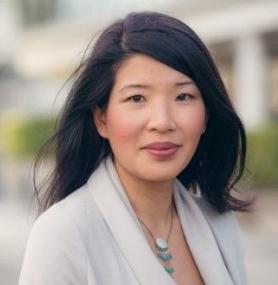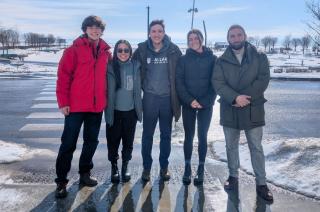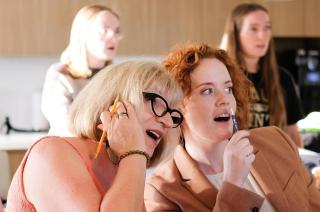A new decade of solidarity and collective action for Asian Canadian lawyers
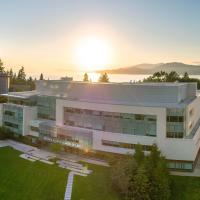
Allard Law
Mar 21, 2023
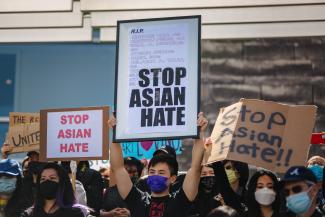
. . . As Asian Canadian lawyers in BC, many of us found ourselves in a unique situation during the pandemic. We have the privilege of influence, of a certain skill set that can protect and empower others. We can open doors. Yet 20 months ago, on top of all the realities of adjusting in terms of provincial orders, social distancing, masking, and changes in our workspaces and home lives, we were also forced to be reminded of our own othering.
COVID-19 has been dubbed the "inequality virus." It has exacerbated inequalities across class, age, disability, gender, and race, as well as highlighted pervasive global inequities as vaccines get distributed disproportionately around the world. There has been a great deal of suffering and harm, which continues. During this time, the arbitrary acts of overt racism that were inflicted upon any random Asian-looking person in Canada exposed a very disturbing form of scapegoating and inner hatred that hurt very much, and caused this additional – very unnecessary – level of worry and stress for many of us on top of everything else.
It has been reported that 43% of BC residents of Asian descent experienced a racist incident during the pandemic, ranging from racial slurs to property damage to physical violence. Reactions from COVID-19 reflected a modern-day version of Yellow Peril, an echoing from our racist histories here in BC and Canada. Videos and stories of deliberate acts of physical and verbal assaults began appearing everywhere in the news, in social media, and in personal recounts from friends and strangers. These accounts invoked other painful memories of the racism one encounters as these minor, and occasionally major, splotches and light undercurrents that can negatively impact an otherwise happy life.
As lawyers and allies, we need to understand that at one point over 175 anti-Asian laws existed in this country. These anti-Asian laws were put in place by our lawmakers, enforced by our judiciary, and maintained by our profession.
Like many, I recall early on in the pandemic when I asked my parents not to go out if they could help it, in case they crossed paths with anyone looking for a vulnerable target for their misplaced anger. I recall periods myself where I was hesitant to go to stores and public spaces not just because of COVID-19, but because I am Asian. The busyness of life and perhaps my tendency to push down unpleasant memories like that make them feel so distant now as we move onto the vaccinated side of this pandemic. But it was only May of this year when a Bloomberg article dubbed Vancouver as the "Anti-Asian Hate Crime Capital of North America." Surprisingly, our local media focused more on doubting whether Vancouver deserved the title of being the worst, as though being second or third in hate crimes per capita makes it any better.
Cultural sites were defaced and grocery stores, bus stops, and Chinatown became places of contestation. How angry that made me feel. How disappointed and sad I was. This is my city and the only home I know. But it does not take a pandemic to have experienced racism here, nor to have predicted it. As much as we want to insulate ourselves from racism, it is important not to sanitize what has happened, and to consider what needs to happen as we think about these next 10 years.
Hypervisibility and invisibility
I would like to reflect upon this odd relationship of hypervisibility and invisibility as Asian Canadian lawyers in BC. Then I would like to talk about allyship and collective action. First, it is important to understand our histories – those we have been born into and those we have inherited. As lawyers and allies, we need to understand that at one point over 175 anti-Asian laws existed in this country. These anti-Asian laws were put in place by our lawmakers, enforced by our judiciary, and maintained by our profession. Asian Canadians were not allowed to vote in BC until 1947, 30 years after white women were given the right to vote; except Japanese Canadians who were not allowed until 1949.
These milestones were only achieved after decades of advocacy from disenfranchised groups. The exclusion era up to the 1950s saw many large-scale anti-Asian demonstrations in Vancouver and the legislated exclusion of Asians from certain professions, including law. For a long period of time, Asian people were viewed as subhuman abstract labour in racial capitalism. Iyko Day points out that it was a history of cheap Asian labour in the 19th century, later fetishized and valued as efficient in the 21st, and a built-in desire – reflected in our laws – for Asians to stay in their place.
It is difficult to fathom the history of settler-colonialism and of racial segregation, discrimination, and devaluation in this province, and indeed in Canada. We don't like it. But it is our reality. We had the Sixties Scoop and residential schools, we still have the Indian Act, we had 200 years of legalized slavery, we had Africville, Japanese Canadian internment camps, Komagata Maru, the Chinese head tax and the Exclusion Act. We don't like to grapple with this history, this racist history of Canada. But it echoes in our institutions and organizational cultures and it influences how bias, stereotyping, and discrimination plays out – who we think deserves to be our colleague, who we think should lead and hold power, and who deserves to have a voice and whether we are willing to hear it.
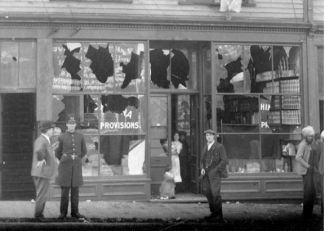
Hypervisibility manifests itself in multiple ways. We saw it quite explicitly in the anti-Asian hate crimes which peaked during COVID-19, from the perpetrators to those complicit bystanders that just walked on by. It shows itself in micro ways, such as pre-COVID when a stranger told me to speak English when I was on a bus chatting in Mandarin to relatives visiting from Taiwan. Or in the multiple instances in my life when I was told to go back to where I came from, in a variety of ways – shouted across the street, through a car window, muttered as they walked past me.
The "University of a Billion Chinese" was a common insult leveled against UBC years on back – so much so that a respected organization even convened a panel on what to do about this problem. I recall being a master’s student on campus over a dozen years ago and wondering if the hypervisibility of my face and my race, and the presence of many students that looked like me, was irritating people. It was as though we were bacteria, only welcome in small doses. Yet ironically UBC faculties and professors were all predominantly white. I'll just add here than when I lateraled to UBC from the University of Victoria as a tenure-track professor in 2017, there were only three professors of colour in a faculty of over 50. I was also the first woman of colour to have received tenure internally at Allard Law, a statistic I kept to myself at the time.
So this hypervisibility, while occasionally taxing for some of us, can also be rather interesting or bizarre when juxtaposed with the invisibility of being Asian.
We see the racialization of poverty, where the disaggregated data shows West Asian, Korean, and Chinese poverty rates at double to triple the poverty rates of white people, and how that is directly linked to structural racism in the labour market. From the pandemic, long-term unemployment has had the sharpest increase among Black, Arab, South Asian, Southeast Asian, Chinese, and Filipino groups, by one and a half to almost double that of white workers. Thanks to the model minority myth, lower-income and working-class Asian people are not given the same kinds of support, something Justice Avvy Go noted and saw on a regular basis during her years of advocacy on behalf of immigrant and racialized communities.
The lack of support on that end is also frustrated by the challenges in disrupting the status quo on the other end. Leaders have the ability to influence how communities thrive and how our most vulnerable in society are protected, and the bamboo and glass ceilings have been very detrimental realities to diversifying leadership. Studies show that people hold predominant biases that Asians are seen as great subordinate employees – considered well-educated and hardworking deferential worker bees – but we are considered to be unqualified as leaders and managers, with white professionals twice as likely to be promoted into management compared to their Asian counterparts. Asian Canadians have been found to be severely underrepresented in leadership across all sectors, and a significant number of studies on implicit and explicit bias have shown prevalent discrimination at both the individual and systemic levels.
...racism didn't just fall from the sky and randomly appear, but is a manifestation of what has been built into our systems from a very checkered and violent history.
Yet the model minority myth is used as leverage to claim the status quo is working just fine while suppressing other racialized groups. Simultaneously, those of us that have broken through some barriers can feel a profound sense of pressure to overproduce in order to meet that stereotype.
This invisibility also stems from the view of us as interchangeable Asians. I was watching "Squid Game" the other day, and a thought occurred to me. It seemed that the show is quite popular, and I wondered: why are people able to tell these Asian characters apart, yet seemed to have so much difficulty doing so for me during my life? I have lost count of how many times I have been mistaken for another Asian woman. My question is, how is one expected to advance in a supposedly merit-based system where networking matters when people cannot tell you apart?
When I practiced in New York I was often confused with two other women in my law firm, and I have frequently been mixed up with other East Asian female lawyers downtown. I suppose I am relieved none of them have done anything to tarnish our reputations, since we seem to be judged as a group.
I want to be clear that I don't relish telling these stories at all. They are embarrassing, and they aren't limited to fleeting instances from strangers, such as the time my own student confused me for someone else even after attending my class for an entire term. I don't hold any ill will, and I know it was not on purpose. But I don't know how to make people see us as individuals worthy of their memory. I don't know what to do about that. So the invisibility, mixed with the hypervisibility, at times can be a lot to take in.
It can also be difficult to be the one to raise the issue. We live in the cult of relatability and a desire for white comfort. How tempting it is to sanitize the racism. How unenjoyable it is to be the one to raise ugly truths.
Prior to our global racial reckoning in the wake of George Floyd and the important work of Black Lives Matter, I used to describe anti-Asian racism as anti-Asian sentiment, as though it was some excusable feeling. I remember being so careful, and I still am – talking about racism and feeling very concerned about the comfort levels of my white colleagues and my audiences. But this is where I turn to allyship and collective action.
Allyship and collective action
With the social movements we have seen – Truth and Reconciliation, #MeToo, Black Lives Matter, Stop Asian Hate – these efforts of many people have helped bring a lot of difficult conversations about colonialism, racism, and intersectionality to the forefront. We need to understand that racism didn't just fall from the sky and randomly appear, but is a manifestation of what has been built into our systems from a very checkered and violent history. For us Asian Canadian lawyers, in order to Stop Asian Hate, we must fight all forms of racism.
I am often troubled by how some tend to pit equity groups against each other, suggesting minorities should be battling each other for the scraps. As Henry Yu put it, that is a road that leads to nowhere. These movements must not be conflated. They are distinctive in their righting of historical wrongs and the uneven ridiculousness of racism. Among other things, these movements aim to eradicate ignorance. But it is not the oppression Olympics; it is not a game show for those who designed the winner's circle to get to pick and choose who they feel sorrier for, while owning the status quo and luxury of complacency. No. These movements should embolden us all with a sense of urgency to think about the ways in which we can transform our organizational cultures, our systems, and our institutions in order to ensure a safe, just, and equitable space for everyone to thrive.
We straddle different cultures and identities, we may hold different politics and ideologies, but as Asian Canadian lawyers, we all have the power to build up. To be anti-racist.
Back to grocery stores as places of contestation. A few months into the pandemic, at that point when our provincial leaders were publicly vocalizing their condemnation of the exponential rise in anti-Asian hate crimes, I decided to go out to buy some essentials. The plan was to stay masked and keep a low profile – get in, get out, go home.
As I entered the store, I grabbed a shopping basket from the stack. While I traveled down the grocery aisle, I realized partway that I was carrying two baskets. As I adjusted the handles, the bottom basket dropped loudly to the floor. Someone then approached me from behind, rather gruffly. My whole body tensed.
I was ready for this person. I had seen months of videos and I wasn't going to be a victim to this garbage. I had my phone ready.
The man leaned into me. Then he said, "Let me get that for you, I'm heading up front anyway." And he picked up the extra basket, and he left.
I tell this non-story because I couldn't believe the relief that washed over me followed by a mix of emotions. Realizing how dehumanizing the whole pandemic experience had been for me as an Asian person. How my faith in humanity had been eroding for so many months, that this simple kind moment from a stranger could cause such a visceral reaction from me. How much I was robbed of feeling secure in public spaces. How much work I knew needed to be done to change that and how exhausting it had all been.
When the Federation of Asian Canadian Lawyers BC launched their documentary But I Look Like a Lawyer, I didn't know what to expect. When I finally saw the video with multiple Asian Canadian lawyers sharing their stories across generations, it took me days to absorb it. The power of collective action. Of feeling like you aren't alone. At the launch, I watched as 850 people joined online and many more watched in groups at law firms and law schools, and it felt surreal. So many speaking out and unpacking their experiences, and those watching in active support.
We have broken ourselves open on the faith that people will listen, learn, and make efforts to do better. Being an ally is a verb and not a noun. As we contemplate the next 10 years, with our climate emergency that we are living in, we are going to need to see the greatest collective action we have ever witnessed in humanity. We cannot shy away from hard conversations. Reflecting on what this next decade needs to look like, it leaves me with a great sense of responsibility, and a need to amplify those around me who are doing good work, and to make space for those coming after me.
For Millennials and Generation Z, environmental and social crises have defined much of their adult lives, along with the recurrent message that time is of the essence. They are going to bear the greatest share of the burden, yet often are not the ones holding positions of power to make impactful decisions about it. In these crucial years, we must amplify our youth who understand collective action better than any of us. As our planetary problems have intergenerational effects, the solutions and paths forward must also include intergenerational voices.
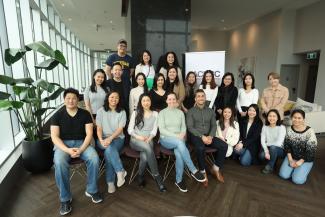
As Asian Canadian lawyers, we have a unique role in society. We were not allowed to be lawyers here 72 years ago. We have opportunities now, to use our education and skills, our hard-fought advantages, to help change the trajectory of our futures. It is beholden on us all to help those more marginalized than us. We have the abilities to disrupt, to protect the powerless, to empower the voiceless, to be courageous, thoughtful, ethical professionals and engaged global citizens, who will not just walk on by when another needs our help. This is what we need to be, to arm ourselves in this next critical decade for our societies and for our planet. It is through intersectional solidarity and collective action that we may be able to bring about change in this world, during what may be the most important decade to frame the kind of inheritance we are leaving for future generations.
As a group, we are diverse ourselves. We straddle different cultures and identities, we may hold different politics and ideologies, but as Asian Canadian lawyers, we all have the power to build up. To be anti-racist. The work FACL BC has done these past 10 years . . . it absolutely floors me. What this Federation has accomplished overwhelms. The mentoring programs, the advocacy for representation, the podcasts amplifying Asian voices, the events with topics I would have only dreamed of being discussed 10-20 years ago.
I want to end by thanking everyone at FACL BC for the inspiration, for being leaders, for being an example of what intergenerational and intersectional collaboration, allyship, and collective action looks like. I toast you on your past 10 years and say congratulations for a fantastic decade of bringing people together and for your advocacy of equity and justice. I sincerely look forward to the next 10 you have before you, with all my heart.
Dr. Carol Liao's keynote address was originally published in the UBC Law Review. Read the full transcript.
- Allard School of Law
